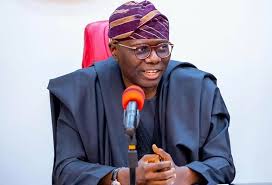Martha Laraba Sambe, an indegene of Sango local government area of Kaduna state, is the Advocacy and communication officer for an NGO called the ‘Education as a Vaccine’.
The graduate of Economics from the American university of Nigeria, Yola, in this chat with ENE OSANG said parents should teach their children sex and reproductive education so as to help them avoid mistakes in life
Can we met you?
My name is Martha Laraba Sambe, I am from kaduna state precisely from the Sango local government area. I am the Advocacy and communication officer at the ‘Education as a Vaccine’, a Nigerian Non Governmental Organisation (NGO) with headquarters in Abuja and branches in Benue, Nassarawa, Cross River and Niger states.
What did you study in school?
I graduated from the American university of Nigeria in Yola where I studied economics but I think doing this NG00 work right now is good for me, it is a learning experience and I have always been passionate about issues that affects women, that is why I like working in the development field.
How did you manage through school considering that girl child education in the north is not that prominent?
Whenever this question comes up when I’m discussing with my friends I always say I thank God for my dad and my grandfather who had no formal education but insisted that my father had to go to school and so my dad went to school, he was a teacher until some point when he started working with PHCN where he worked for up to 3years so they value education and am from a family of three girls and all my sisters and I went to school even though some of my dad relatives laughed at him that he spent so much money on female children but because he valued education and knew the impact he was leaving in our lives so he insisted we had to go to school. I am thankful to my parents for that.
Do you think girl child education has improved in the north?
I can’t give a particular number or percentage now because I cannot back it up but I think there is room for improvement because we are not doing enough as far as northern girl child education is concerned. I also think this is not only in the north but in Nigeria as a whole we should strive harder on girl-child education.
What else do you do apart from NGO work?
I do write sometimes, I have written for one magazine before and sometimes I also do freelance.
How do you manage doing NGO work and still have time for yourself?
I think priority is the key. You have to place your work in order of priorities and you cannot do everything in one day so, you do what you can and at the end of the day rest is essential.
What are your hubbies?
I read a lot but if am not reading I am either watching something or sleeping that is how I relax.
What does your NGO do basically?
We work with young people basically around sexual and reproductive health so we provide services that help them increase their knowledge about the sexual and reproductive health and we work with children as well in terms of providing access to education mostly in the rural areas. We also have other projects that are not necessarily targeted young people explicitly like the female condom advocacy project which we are working on.
Why did you choose to work with young people and are there any challenges?
Working with young people is interesting and exciting because they are vibrant and so they bring their youthful energy to whatever situation you are working with them on and that can be motivating. I think what is important for me in working with young people is being a part of sexual and reproductive change for young Nigerians because we grew up in times that it was difficult to get information so most of us made certain mistakes and that is why my organisation is working to ensure that young people get adequate information so it feels good to know that am a part of people bringing change to young Nigerians.
Do you think it is safe to educate young people on sex and reproductive health?
I think it is good that youths know about sexual and reproductive health infact, they don’t know enough and this lack of knowledge can have adverse effect on them in the future so, I think it is very good that youths know a lot about their reproductive health. They should know what to expect, they should know when there is something wrong so they can tackle it immediately.
Researchers have shown that infection is one of the major causes of infertility and many Nigerian women don’t know that so, they just go around with sexually transmitted infections and when it’s time for them to have children they cannot and yet they don’t know the cause.
If you provide information for people they know how to make informed decisions, we are not teaching people to go about having sex like people think rather we educate them to enable them make decisions that will improve their lives positively.
There is a lot of immorality in the society when we look at it from a religious or cultural standpoint because the way young people are is like they have been wired to experiment new things like when they reach puberty it’s something they want to find out themselves. But rather than let them make mistakes by allowing them try out things themselves, we are telling how to go about it without making mistakes that will affect their lifestyle for the rest of their lives.
How do you go about educating people?
We have different programmes but our most interactive programme is the ‘my question and answer project which gives young people the opportunity to call, send text messages, e-mails or even chat with councilors who lecture them about sexual and productive health.
In the other states, we go to various local government and meet with people in those local government’s who work with primary health care centres and sometimes we even check the health centres to ensure the young people have access to quality and accurate health services so, there are different ways we work
Do you think the government has a role to play in educating young people on sexual and reproductive health?
Yes government’s role is to provide funding and apart from that, I don’t think we have a comprehensive sex syllabus in Nigerian education system. I think the ministry of health and the ministry of youth development need to. Include sex education into our education curriculum especially in primary and secondary school so that young people will be informed because a lot of parents do not give their children such education, so I think its in our best interest to include this in educational curriculum.
Are the youths complying with the idea of your NGO?
I think so because we have been existing since over twelve years. If we weren’t doing well we wouldn’t have lasted this lobg so yes I think there is high level of acceptability. In June last year we hit a target of about 15, 000 questions in one month, and even at the rural areas we have gone to there is high acceptability. Also, we have worked with the ministry of health in the past.
What is your take on the advocacy for the use of female condoms?
I think female condom is needed because they are useful in the sense that they encourage women to take control of their sexual and reproductive health and also it protects women of sexual age.
A female condom is something they cannot do without because it is essential for protecting themselves against diseases and unintended pregnancies so I am in support of it.
Don’t you think this advocacy on female condoms will encourage immoral sex among girls?
That was what they said when the male condoms was introduced but I don’t think it encourages them, I think it protects them because whether we like it or not people are going to have sex either within or outside marriage so as much as they are going to they might as well think about the consequences and think of protecting themselves.
How would you rate the acceptance of female condom?
Research has it that only about 4% but I wouldn’t think the level of acceptance is up to 20% yet because Nigeria is a very big country and right now we are working in only about 5 states and there is no wide acceptance and we have not even done half of Nigeria yet so its acceptance is poor.
Do you think government supports this call for use of female condoms?
Not yet, government is not supporting this enough as much as they did for the male condom because everywhere you go you can see advertisement about male condoms but non about female condom.
Could this be as a result of gender imbalance in the Nigeria?
I think its about because in Nigeria we are a religious and cultural people and the idea about female condoms upsets us a lot because it is basically women taken charge of their bodies and them opening their legs to insert it so people don’t want to talk about it be we are religious and cultural we think that we are exposing women too much so its seen like a taboo.
I think it is going to be accepted like the male condom but it will take a lot of handwork on advocacy.
What is your advice for Nigerians especially women?
I urge Nigerians to accept the female condom because they are not bad but rather are protective of your loves one.
Parents don’t talk sex to children where is this leading us?
It is leading us to where our children will sneak behind our backs to practice what they were not thought and this could lead to unintended pregnancies and contracting of diseases so this would not help us achieve anything. I think we should talk to our children, tell them the truth if they insist they want to have sex let them use protection, but abstinence remains the best way.



